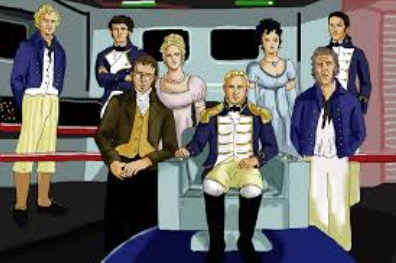Onward to the Age of Sail?
The best science fiction doesn't just extrapolate physical sciences conveniently to tell an old form of story; it should try to show what social and cultural changes would be forced by new circumstances.
I've had trouble reading and watching "science fiction" lately, though I've loved it since I picked up Robert Heinlein's "Space Cadet" at the age of nine, on my first public library visit. I put "science fiction" in quotes to clarify my problem is not with real science fiction, as I now define the term; it's with the Boy's Adventure Stories that I'd been calling SF all my life, but now think they should be called fantasy - wish-fulfillment fantasy, at that.
 My misgivings crystallized recently when I read that Alastair Reynolds, a real astronomer and now mostly a full-time author, noted that he won't write SF in which the speed-of-light is exceeded; he considers that detail alone makes it fantasy, not SF. But my problem started many years ago when I read Larry Niven and Jerry Pournelle's "making of" essay about the "science" of space travel in their famous novel, "The Mote in God's Eye" ("Building the Mote in God's Eye", January 1976 Galaxy, reprinted in Niven's N-Space), specifically to recreate the dramatic environment of Admiral Nelson's battleships. They wanted battles that replicated the costly heroics of centuries past, where ships would carry three times the sailors needed to crew them, on the assumption that the battle would be one of attrition: cannonballs chopping out gobbets of wood and human limbs.
My misgivings crystallized recently when I read that Alastair Reynolds, a real astronomer and now mostly a full-time author, noted that he won't write SF in which the speed-of-light is exceeded; he considers that detail alone makes it fantasy, not SF. But my problem started many years ago when I read Larry Niven and Jerry Pournelle's "making of" essay about the "science" of space travel in their famous novel, "The Mote in God's Eye" ("Building the Mote in God's Eye", January 1976 Galaxy, reprinted in Niven's N-Space), specifically to recreate the dramatic environment of Admiral Nelson's battleships. They wanted battles that replicated the costly heroics of centuries past, where ships would carry three times the sailors needed to crew them, on the assumption that the battle would be one of attrition: cannonballs chopping out gobbets of wood and human limbs.
 So Larry and Jerry invented the "Langston Field" that absorbed all laser energy zapped at the ship, but could only handle so much, leading to "burn-throughs" where you'd suddenly lose a chunk of ship (and people) where the field broke down and let a few hundred gigajoules through. They re-created the effect of a cannonball hitting a wooden ship, when we know it would be hard to hit, say, a submarine almost anywhere without destroying it. Presto! The military of the time has to re-invent the whole British Navy in space, with six levels of officers (some, teenaged midshipmen) ready to step in for the Captain when he's fried.
So Larry and Jerry invented the "Langston Field" that absorbed all laser energy zapped at the ship, but could only handle so much, leading to "burn-throughs" where you'd suddenly lose a chunk of ship (and people) where the field broke down and let a few hundred gigajoules through. They re-created the effect of a cannonball hitting a wooden ship, when we know it would be hard to hit, say, a submarine almost anywhere without destroying it. Presto! The military of the time has to re-invent the whole British Navy in space, with six levels of officers (some, teenaged midshipmen) ready to step in for the Captain when he's fried.
Unlike modern ship- and air-crews who mostly expect to be either fine or vaporized after WW3, these future crews offer tremendous dramatics. They must be willing to stick with the fight as the Langston Field redlines, the best friends dying beside them, enduring horrifying battles of courage and spirit.
Quote from authors' essay linked above:
Ships [have] large crews who have little to do unless half of them get killed. That's much like the navies of fifty years ago.
A merchant ship might have a crew of forty. A warship of similar size carries a crew ten times as large. Most have little to do for most of the life of the ship. ... Without the Field as defense against lasers and nuclear weapons, battles would become no more than offensive contests. They'd last microseconds, not hours... ( Boring! Our readers want a fight!)
 I was shocked to find no reviews of the book that busts them for snitching from Star Trek, which William Shatner likened to "Horatio Hornblower in space", with similar phaser blasts rocking the Enterprise deck, "the shields buckling," and Scotty crying out that the engines are gonna blow. "The Mote in God's Eye" even featured a Scottish chief engineer on the ship, in an identical nod to the many Scots found in steamship engine rooms for some generations.
I was shocked to find no reviews of the book that busts them for snitching from Star Trek, which William Shatner likened to "Horatio Hornblower in space", with similar phaser blasts rocking the Enterprise deck, "the shields buckling," and Scotty crying out that the engines are gonna blow. "The Mote in God's Eye" even featured a Scottish chief engineer on the ship, in an identical nod to the many Scots found in steamship engine rooms for some generations.
Star Trek is by far the best-known of the SF stories that replicate the crew roster of the "Hornblower era" of sailing ships at exploration and war, but dozens of authors make the assumption; at least the authors of "The Mote in God's Eye" admitted it. I'm forced to conclude that no reviewer brought this up because ripping off your 28th century space ship organization-chart from a thousand years earlier is just so common that nobody pauses to wonder if space ships might have different needs. (On TV, I can't think of an exception to this, actually: Babylon 5, Battlestar Galactica - every space crew larger than a family is run by the British Navy. Even the aliens have First Officers and so forth!)
SF has always been about "what if" something new changed everything? What different society would we have because of teleportation, or AI doing everything for free, or a Youth Serum? This, instead, is "what if there was FTL but the physics of it required everything about exploration ship crews to stay exactly the same"?
 The little-seen SF movie "Sunshine", by Danny Boyle (2007), showed a more-likely spaceship crew and captain. Tasked with saving the world and in dire peril of failure, the half-dozen genius-expert astronauts with a hard decision to make, all look over to their captain.
The little-seen SF movie "Sunshine", by Danny Boyle (2007), showed a more-likely spaceship crew and captain. Tasked with saving the world and in dire peril of failure, the half-dozen genius-expert astronauts with a hard decision to make, all look over to their captain.
 But the captain shrugs and says that while he expects obedience in an emergency situation, he respects his crew of smart people and major strategic decisions should be voted on. Not many situations will require the Lone Hero figure. Nobody who wants to be a Lone Hero will be chosen for the captain's job!
But the captain shrugs and says that while he expects obedience in an emergency situation, he respects his crew of smart people and major strategic decisions should be voted on. Not many situations will require the Lone Hero figure. Nobody who wants to be a Lone Hero will be chosen for the captain's job!
Space battles are unlikely, of course, for any ships we can seriously imagine today. There's no need for "photon torpedos" when your smallest bomb -- or even a dozen ball-bearings at high speed -- could utterly devastate the very light construction mandatory for space ships. Most decisions on a space ship would be months in the making, because they take months to get anywhere. Many problems would be intensely technical, where only a few experts can even have relevant knowledge to make a decision; opportunities for a captain to be more than a meeting chair and rubber-stamp will be few. Actually, I suspect that "meeting-chair and rubber-stamp for its decisions" might well describe the job of "Aircraft Carrier Captain" even today.
My problem with "FTL stories" isn't actually the FTL itself. It's that having used magic at all, authors then want some exact magic that provides for the story they want to tell - and it's not a new, science-fictional, what-if story; it's just medieval-swordfight-to-decide-who-is-king story (Star Wars), or a Korean-War-Band-of-Brothers-vs-Communist-Hordes story (Starship Troopers, the movie), or, worst of all, a Star Trek episode where the colony worlds are just hours apart if the plot needs it, and months apart if the plot needs that.
 My own most-favourite SF are the Culture novels of Iain Banks that not only feature FTL, but the truly preposterous assumption that multiple human races evolved on various planets independently. But they're cracking good stories, so shut up and let me read.
My own most-favourite SF are the Culture novels of Iain Banks that not only feature FTL, but the truly preposterous assumption that multiple human races evolved on various planets independently. But they're cracking good stories, so shut up and let me read.
It was Banks that really broke the Star Trek paradigm for ship-command with a genuine SF proposal, one that says the future is just different.
Nearly all the "AI" stories that had been written to that point had one of two visions. First,the "Frankenstein complex" that Asimov decried with his "3 Laws of Robotics": that AI would be our enemy. Second, the use of AI as just another character (Mr. Data). The character might have vast powers over cyberspace, starting with "Mike" in "The Moon Is A Harsh Mistress"; but can't see how to run the world any better than we. Banks offered the very humbling proposition that AI would not only be so much smarter that it could manage society, but that it would, far from the villain, be nicer and more honest and decent than we, as well - the obvious "persons" to put in charge.
How much smarter? In one story, Banks rubbed it in by having the Culture people watch a Star Trek episode and crack up laughing at the very idea of a human captain of a starship, because it would be like one of your mouth bacteria deciding it was now "captain" of the whole body.
In Banks stories, the AI running a ship takes suggestions from its passengers, but that's it. AI runs the ship, and the whole Culture. It's like a Copernican Revolution for SF: instead of empowering humans to be more and more important, until they can blow up galaxies like EE Smith, the really original proposal is that mere humans are no longer the most-important characters in the story, because they're too dumb and, especially, too mean.
Dan Simmons had a gentler "AI" criticism of the TV-set ship's bridge with its nice central command chair and ring of officer's stations. His "Hyperion" novels feature a scene where the beleaguered protagonist party make it to the space yacht of a rich member; they are befuddled to find themselves in a comfortable oaken den that would have pleased Sherlock Holmes. Sinking into an easy chair, the rich owner laughs at them for expecting command consoles, and points out he has no idea how to run a starship. "Hey, ship! Take us back to Earth!".
 I will return to this point in a later essay about our whole civilization, not just one ship's crew: an SF novel has failed if it supposes that a future challenge needs only a change to our physical capabilities, anti-gravity or tabletop fusion; that we can handle the future already, just as we are. That we already have all the social tools and organization we might need, that we already know how to conquer space.
I will return to this point in a later essay about our whole civilization, not just one ship's crew: an SF novel has failed if it supposes that a future challenge needs only a change to our physical capabilities, anti-gravity or tabletop fusion; that we can handle the future already, just as we are. That we already have all the social tools and organization we might need, that we already know how to conquer space.
It's a natural, inborn fault, probably: we embrace change in physical technologies very eagerly, but cling to old social formulas, way past their cost-benefit expiry date.
Science Fiction should open up the mind to possibilities, however. Authors should be just as willing to say "we need to become smarter and better-behaved in the future" as say "we just need more powerful tools". So far, most of them are claiming that we could have stuck Captain Jack Aubrey aboard Apollo 11, and have had the mission work out fine.
Main Page and Index
Text is COPYRIGHT, Roy Brander, 2017. All graphics are available Internet grabs that link to their source, and will be taken down upon request, to "roy.brander" at Google's mail system. (Nyah, nyah, stupid spambots!)
 My misgivings crystallized recently when I read that Alastair Reynolds, a real astronomer and now mostly a full-time author, noted that he won't write SF in which the speed-of-light is exceeded; he considers that detail alone makes it fantasy, not SF. But my problem started many years ago when I read Larry Niven and Jerry Pournelle's "making of" essay about the "science" of space travel in their famous novel, "The Mote in God's Eye" ("Building the Mote in God's Eye", January 1976 Galaxy, reprinted in Niven's N-Space), specifically to recreate the dramatic environment of Admiral Nelson's battleships. They wanted battles that replicated the costly heroics of centuries past, where ships would carry three times the sailors needed to crew them, on the assumption that the battle would be one of attrition: cannonballs chopping out gobbets of wood and human limbs.
My misgivings crystallized recently when I read that Alastair Reynolds, a real astronomer and now mostly a full-time author, noted that he won't write SF in which the speed-of-light is exceeded; he considers that detail alone makes it fantasy, not SF. But my problem started many years ago when I read Larry Niven and Jerry Pournelle's "making of" essay about the "science" of space travel in their famous novel, "The Mote in God's Eye" ("Building the Mote in God's Eye", January 1976 Galaxy, reprinted in Niven's N-Space), specifically to recreate the dramatic environment of Admiral Nelson's battleships. They wanted battles that replicated the costly heroics of centuries past, where ships would carry three times the sailors needed to crew them, on the assumption that the battle would be one of attrition: cannonballs chopping out gobbets of wood and human limbs.
 So Larry and Jerry invented the "Langston Field" that absorbed all laser energy zapped at the ship, but could only handle so much, leading to "burn-throughs" where you'd suddenly lose a chunk of ship (and people) where the field broke down and let a few hundred gigajoules through. They re-created the effect of a cannonball hitting a wooden ship, when we know it would be hard to hit, say, a submarine almost anywhere without destroying it. Presto! The military of the time has to re-invent the whole British Navy in space, with six levels of officers (some, teenaged midshipmen) ready to step in for the Captain when he's fried.
So Larry and Jerry invented the "Langston Field" that absorbed all laser energy zapped at the ship, but could only handle so much, leading to "burn-throughs" where you'd suddenly lose a chunk of ship (and people) where the field broke down and let a few hundred gigajoules through. They re-created the effect of a cannonball hitting a wooden ship, when we know it would be hard to hit, say, a submarine almost anywhere without destroying it. Presto! The military of the time has to re-invent the whole British Navy in space, with six levels of officers (some, teenaged midshipmen) ready to step in for the Captain when he's fried.
 I was shocked to find no reviews of the book that busts them for snitching from Star Trek, which William Shatner likened to "Horatio Hornblower in space", with similar phaser blasts rocking the Enterprise deck, "the shields buckling," and Scotty crying out that the engines are gonna blow. "The Mote in God's Eye" even featured a Scottish chief engineer on the ship, in an identical nod to the many Scots found in steamship engine rooms for some generations.
I was shocked to find no reviews of the book that busts them for snitching from Star Trek, which William Shatner likened to "Horatio Hornblower in space", with similar phaser blasts rocking the Enterprise deck, "the shields buckling," and Scotty crying out that the engines are gonna blow. "The Mote in God's Eye" even featured a Scottish chief engineer on the ship, in an identical nod to the many Scots found in steamship engine rooms for some generations.
 The little-seen SF movie "Sunshine", by Danny Boyle (2007)
The little-seen SF movie "Sunshine", by Danny Boyle (2007) But the captain shrugs and says that while he expects obedience in an emergency situation, he respects his crew of smart people and major strategic decisions should be voted on. Not many situations will require the Lone Hero figure. Nobody who wants to be a Lone Hero will be chosen for the captain's job!
But the captain shrugs and says that while he expects obedience in an emergency situation, he respects his crew of smart people and major strategic decisions should be voted on. Not many situations will require the Lone Hero figure. Nobody who wants to be a Lone Hero will be chosen for the captain's job!
 My own most-favourite SF are the
My own most-favourite SF are the 